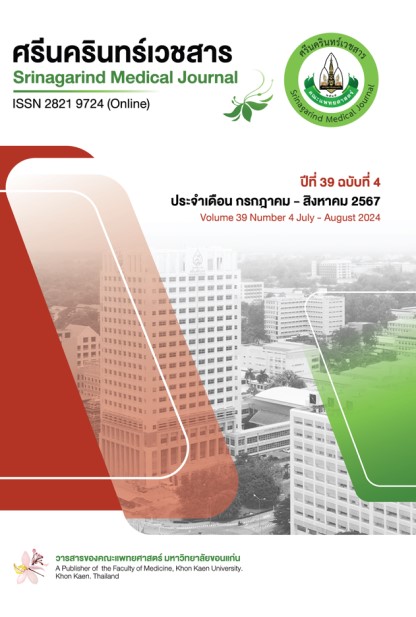Undiagnosed Placenta Accreta Spectrum Before Birth at the Delivery Room Obstetric Emergency in Srinagarind Hospital, Khon Kaen Province: A Case Report
Keywords:
placenta accreta spectrum, obstetric emergency, cesarean section, placenta previa, postpartum careAbstract
Background and Objectives: Spectrum (PAS) was a condition that poses a life-threatening risk to both the mother and the baby. The objective of this study was to provide a guideline for the development of care for pregnant women who were unaware of having placenta accreta before delivery.
Methods: One case study was selected where placenta accreta was not detected before delivery. The patient received care in the delivery unit at Srinagarind Hospital. Data were collected from medical records, delivery reports, and the hospital's information system.
Results: The patient, a 38-year-old married Thai woman in her third pregnancy at 27+2 weeks of gestation, had a history of two previous normal vaginal deliveries. In this pregnancy, she was diagnosed with placenta previa and experienced abnormal vaginal bleeding in the early stages. She was referred from the Chaiyaphum Hospital to the delivery unit at Srinagarind Hospital, Khon Kaen, due to premature rupture of membranes. She was treated with labor-inhibiting medication. After one day of observation in the delivery unit, she experienced strong and frequent uterine contractions with heavy fresh vaginal bleeding. An emergency cesarean section was performed, during which placenta accreta was discovered. An emergency hysterectomy was conducted. Post-operatively, the mother received continued care in the postpartum ward, and the newborn was transferred to the neonatal intensive care unit.
Conclusion: Accurate prenatal diagnosis of placenta accreta and clear guidelines for managing undiagnosed cases of placenta accreta could significantly reduce the incidence of morbidity and mortality in pregnant women.
References
Fonseca A, Ayres de Campos D. Maternal morbidity and mortality due to placenta accreta spectrum disorders. Best Pract Res Clin Obst Gynaecol 2021;72:84-91. doi:10.1016/j.bpobgyn.2020.07.011.
Matsuzaki S, Mandelbaum RS, Sangara RN, McCarthy LE, Vestal NL, Klar M, et al. Trends, characteristics, and outcomes of placenta accreta spectrum: a national study in the United States. Am J Obst Gynecol 2021;225(5):534.e1-.e38. doi: 10.1016/j.ajog.2021.04.233.
Cahill AG, Beigi R, Heine RP, Silver RM, Wax JR, Placenta accreta spectrum. Am J Obst Gynecol 2018;219(6):B2-B16. doi:10.1016/j.ajog.2018.09.042.
Donovan BM, Shainker SA. Placenta accreta spectrum. Neoreviews 2021;22(11):e722-e33. doi:10.1542/neo.22-11-e722.
Rani V, Jain S, Nanda S, Malhotra V, Chauhanand MB, Sangwan N. Placenta accrete spectrum-management and fetomaternal outcome at a tertiary care centre. Int J Clin Obstet Ghnaecol 2019;3(5):84-9. doi:10.33545/gynae.2019.v3.i5b.334
Silver RM, Branch DW. Placenta accreta spectrum. N Engl J Med 2018;378(16):1529-36. doi:10.1056/NEJMcp1709324.
Jauniaux E, Bunce C, Grønbeck L, Langhoff-Roos J. Prevalence and main outcomes of placenta accreta spectrum: a systematic review and meta-analysis. Am J Obst Gynecol 2019;221(3):208-18. doi:10.1016/j.ajog.2019.01.233.
Lucidi A, Jauniaux E, Hussein A, Coutinho C, Tinari S, Khalil A, et al. Urological complications in women undergoing Cesarean section for placenta accreta spectrum disorders: systematic review and meta-analysis. Ultrasound Obstet Gynecol 2023;62(5):633-43. doi:10.1002/uog.26299.
Shamshirsaz AA , Fox KA , Salmanian B , Diaz-Arrastia CR , Lee W , Baker BW , et al. Maternal morbidity in patients with morbidly adherent placenta treated with and without a standardized multidisciplinary approach . Am J Obstet Gynecol 2015;212(2):218.e1 doi:10.1016/j.ajog.2014.08.019.
Rani K, Srivastava S. Placenta accreta spectrum: risk factors and fetomaternal outcome after multidisciplinary team approach. New Indian J OBGYN 2021;8(1):112-6. doi:10.21276/obgyn.2021.8.1.21
Marshall NE, Fu R, Guise JM. Impact of multiple cesarean deliveries on maternal morbidity: a systematic review. Am J Obstet Gynecol 2011;205(3):262.e1-8. doi:10.1016/j.ajog.2011.06.035.
Silver RM, Landon MB, Rouse DJ, Leveno KJ, Spong CY, Thom EA, et al. Maternal morbidity associated with multiple repeat cesarean deliveries. Obstet Gynecol 2006;107(6):1226-32. doi:10.1097/01.AOG.0000219750.79480.84.
Jauniaux E, Bhide A, Kennedy A, Woodward P, Hubinont C, Collins S. FIGO consensus guidelines on placenta accreta spectrum disorders: Prenatal diagnosis and screening. Int J Gynecol Obstet 2018;140(3):274-80. doi:10.1002/ijgo.12408.
Berkley EM, Abuhamad AZ. Prenatal diagnosis of placenta accreta: is sonography all we need? J Ultrasound Med. 2013;32(8):1345-50. doi:10.7863/ultra.32.8.1345.
Comstock CH, Bronsteen RA. The antenatal diagnosis of placenta accreta. BJOG 2014;121(2):171-81. doi:10.1111/1471-0528.12557.
Ishibashi H, Miyamoto M, Shinmoto H, Soga S, Matsuura H, Kakimoto S, et al. The use of magnetic resonance imaging to predict placenta previa with placenta accreta spectrum. Acta Obstet Gynecol Scand 2020;99(12):1657-65. doi:10.1111/aogs.13937.
Srisajjakul S, Prapaisilp P, Bangchokdee S. Magnetic resonance imaging of placenta accreta spectrum: a step-by-step approach. Korean J Radiol 2021;22(2):198. doi:10.3348/kjr.2020.0580.
Sheng B, Jiang G, Ni J. Association between postpartum depression and postpartum hemorrhage: A systematic review and meta-analysis. Acta Obstet Gynecol Scand. 2024; 103: 1263-1270. doi:10.1111/aogs.14795
Downloads
Published
How to Cite
Issue
Section
License
Copyright (c) 2024 Srinagarind Medical Journal

This work is licensed under a Creative Commons Attribution-NonCommercial-NoDerivatives 4.0 International License.




